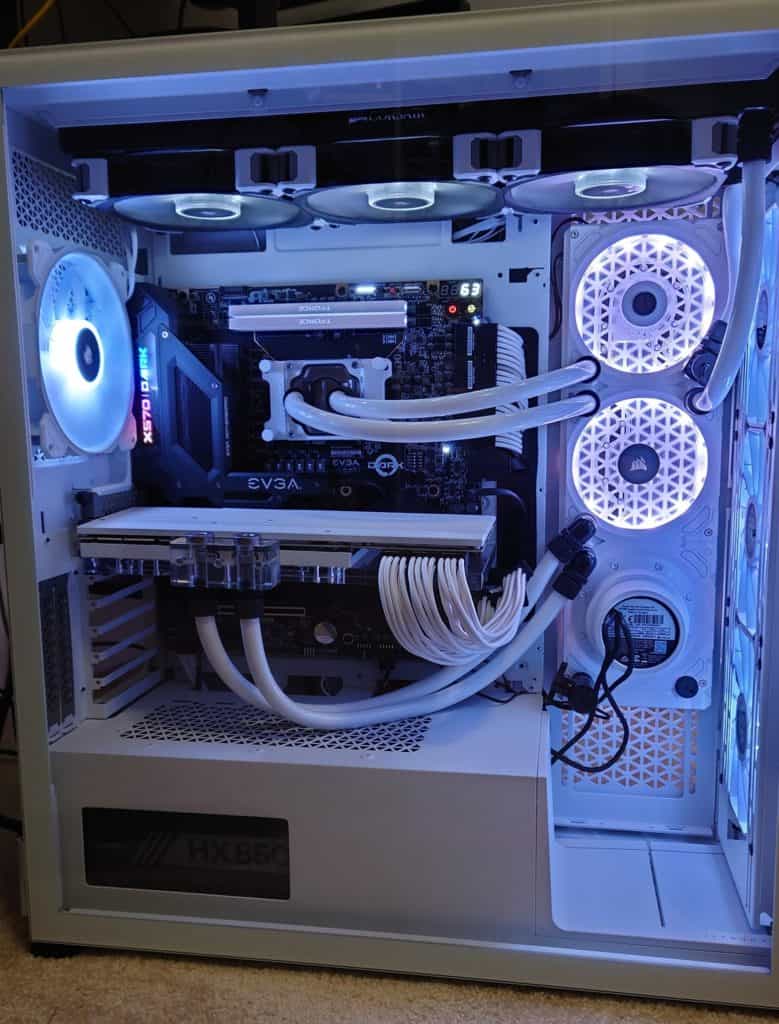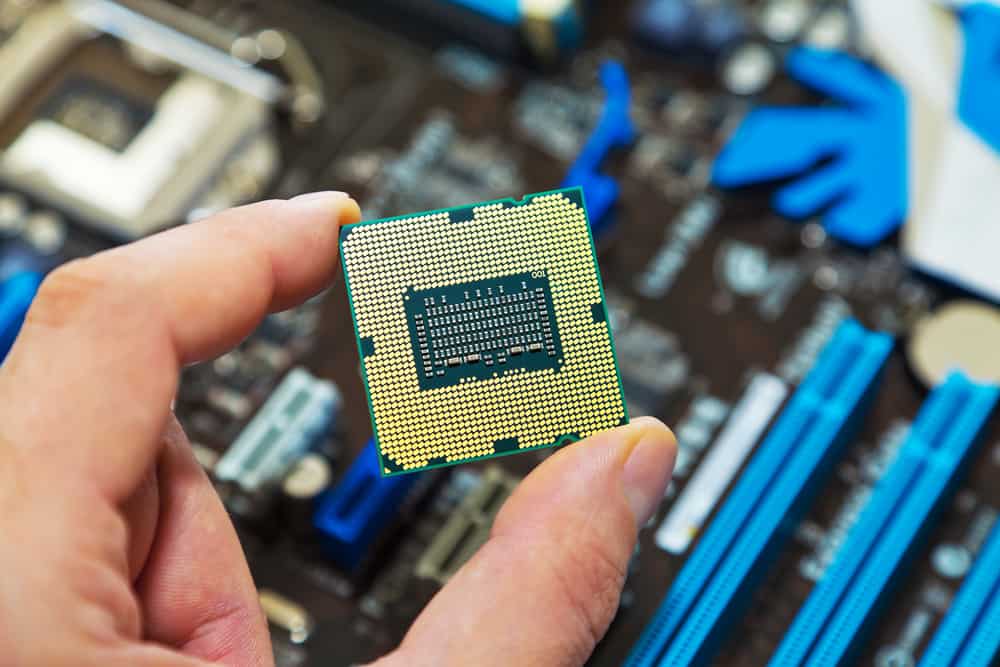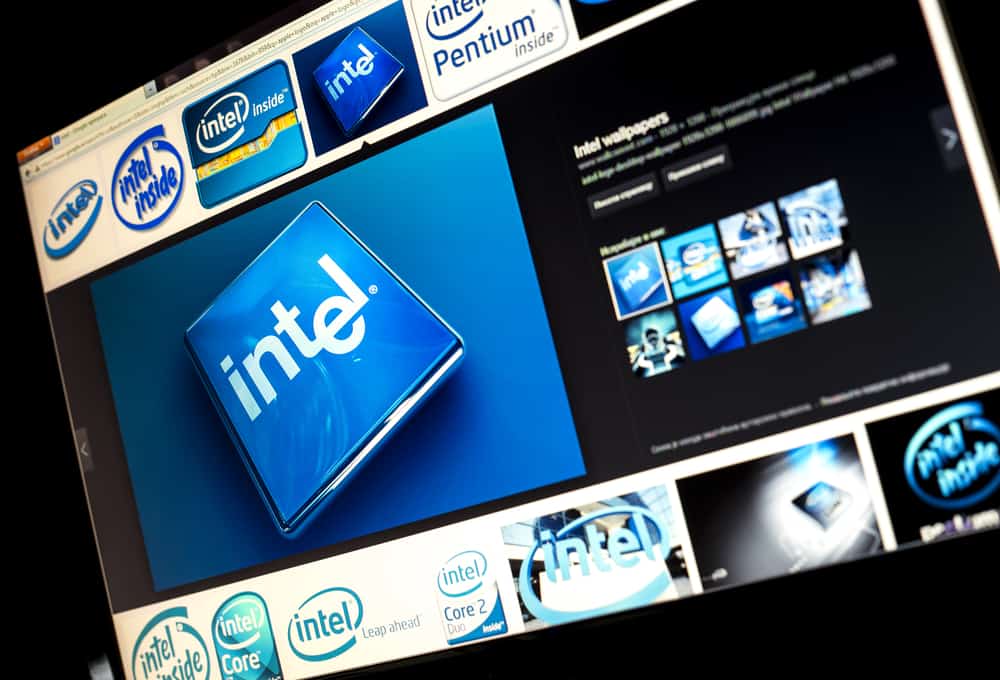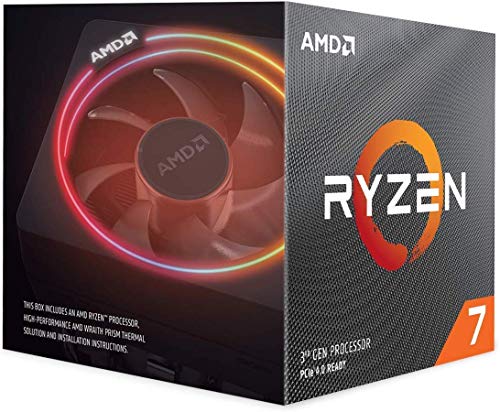- Front Case Fan Not Spinning: [3 Proven Fixes That Work - June 22, 2022
- Is 60 Degrees Celsius Hot For A CPU In 2022? [Must-Read] - June 7, 2022
- How To Handle CPU Temps Jumping: A Definitive Guide [2022] - June 2, 2022
Computer Processing Units or CPUs have come a long way from their first conception. Almost all CPUs in the market right now are capable of multitasking.
However, just buying any CPU that can multitask your gaming or work programs is not enough. You need to ask yourself, “What is the best CPU for multitasking?”
We at Maximum-Tech, your guide to everything PC, intensely researched and tested most CPUs in the market for different purposes to give you a hands-on and genuine experience on these CPUs.
We created a buying guide that will help you choose a CPU by teaching you what to look for in a CPU for multitasking, which company does it best and other helpful tips that you should know.
We identified seven processors that can multitask at excellent levels through our intense review of CPUs in the market and the guide we created. Out of all of them, the best processor for multitasking is AMD Ryzen 9 5950X.
Read on!
Contents
Best CPU For Multitasking
- AMD Ryzen 9 5950X
- Intel Core i9-10900K
- Intel Core i7-10700K
- AMD Ryzen 7 3700X
- AMD Ryzen 7 5800X
- Intel Core i9-9900K
- AMD Ryzen 9 3900X
Our Top 3 Recommendations

- Coming with 16 cores and 32 processing threads for the most powerful performance
- Tested for multitasking, delivered, and then some!
- Mindblowing PBO (Precision Boost Overdrive) feature that increases clock speed to 4.9 Ghz
- For the advanced Socket AM4 platform, can support PCIe 4.0 on X570 and B550 motherboards

- 10 Cores / 20 threads, ensuring seamless multitasking
- Up to 5.3 GHz unlocked speed for maximum power when executing heavy tasks
- Outstanding Intel Turbo Boost Max Technology 3. 0 support
- Intel Optane Memory support easily accelerates system performance and responsiveness
Simply the best processor capable of executing multiple tasks.
It contains 16 cores and 32 threads and runs at 3.4 GHz up to 4.9 GHz thanks to its overclocking feature.
Compared to its competitors, this processor is on top regarding performance, energy efficiency, and thermoregulation.
Do check that one out!
- It has an outstanding overall performance
- It has a better IPC compared to its predecessors.
- It has a powerful overclocking feature.
- It is the most equipped when it comes to multitasking.
- It does not have an integrated graphics card.
This processor is what people think of first when it comes to multitasking.
Boasting a build of 16 cores and 32 threads, the AMD Ryzen 9 5950X can handle enormous amounts of work. In fact, this beast can handle any multithreaded application simultaneously without any signs of slowing.

Speaking of speed, the AMD Ryzen 9 5950X runs at the base clock speed of 3.4 GHz and up to 4.9 GHz, thanks to its XMP (Extreme Memory Profile) and PBO (Precision Boost Overdrive) features.
Yep, you’ve read it right.
This AMD processor has an overclock feature and can boost its base frequency to improve multicore performance.
Quite awesome!
In addition, the AMD Ryzen 9 5950X flaunts a 19% IPC (Instruction Per Cycle) increase compared to existing Ryzen processors, thanks to its Zen 3 microarchitecture. Its increased percentage further enables this AMD processor to process data at higher rates.
The AMD Ryzen 9 5950X contains 72 MB of cache memory ( 64MB for L3 Cache and 8 MB for L2 Cache) for better resource use, latency reduction, and execution time reduction. Its high cache memory allows your computer to become faster and feel smoother when working or playing your favorite game.
A Dota 2 fan? No worries at all. This CPU will handle the game with ease. Check out our guide here to find out the best processor for “Dota 2.”
On a sidenote, check out our popular guide on the best CPU for Warzone if you happen to be a “Call Of Duty” fan like me.
In terms of connectivity, the Ryzen 9 5950X supports Gen 4.0 PCIe lanes and up to 128 GB of dual-channel DDR4-3200 when it comes to memory.
These specifications allow the 5950X to handle many tasks and programs without any performance issues.
Next, the AMD Ryzen 9 5950X is a leader in energy efficiency, thanks to its Zen microarchitecture. Comparing the AMD processor with its Intel equivalent – Intel Core i9-10980XE, the 5950X consumes less power at their maximum theoretical workload ( 105 W vs. i9-10980XE’s 125 W).
Compared to other processors, the 5950X still comes out on top in terms of IPC, thermoregulation, and energy efficiency.
The AMD Ryzen 9 5950X tops the leaderboard in single-core performance, multi-threaded encoding, and application start-up against multitasking-made processors like i9-10980XE, Threadripper 3960X, i7-10700K.
- It can perform multitasking with relative ease.
- It has an overclocking feature that further boosts its speed
- It has Intel Optane memory support.
- It has a strong overall performance
- It requires good thermal cooling to get good clock speeds
- It lags behind AMD processors when it comes to connectivity support
The Intel Core i9-10900K is a solid single- and multi-threaded performer. Multitasking is not a problem for you if you are using this processor.
This Intel Core processor has 10 fantastic cores, and 20 threads build. Its high number of core and thread counts tells you that the Intel Core i9-10900K will operate at fantastic rates no matter how many applications you run.
It has a base frequency of 3.7 GHz. It can be boosted up to 5.3 GHz thanks to its overclock feature, Intel Turbo Boost Max Technology 3.0, and Intel Thermal Velocity Boost.
It boasts a 20MB cache memory for reduced latency, execution time, and improved resource use.
The Intel i9-10900K supports Gen 3.0 PCIe lanes and dual-channel DDR4-2933 for its connectivity.
In addition, the Intel Core i9-10900K features Intel Optane memory support.
Compared to the earlier entries in this list, the Intel Core i9-10900K is a bit behind as AMD processors are now offering Gen 4.0 PCIe and DDR4-3000 support.
Intel Optane memory is a non-volatile memory that accelerates your system’s performance and responsiveness.
This allows your system to become faster in operating multiple programs and responding to various inputs like switching between files or applications.
In terms of performance, the Intel Core i9-10900K can compete with the Ryzen 9 5950X thanks to its core count and technology.
However, its solid single- and multi-threaded performance is brought by its high power consumption (125 W at its maximum theoretical workload).
The Intel Core i9-10900K has a thermal velocity boost which increases performance when it’s below its maximum temperature. However, it has a high power consumption that causes the processor to get too hot.
You’ll need an excellent cooling system to regulate its thermals and to prevent its performance from degrading.
Regarding public opinion, their view on the Intel Core i9-10900K is divided.
On the one hand, consumers praise the Intel processor for its overall solid performance. On the other hand, people have commented on its requirement for thermal cooling, high power consumption, and lagging connectivity support.
The Intel Core i7-10700K is one of Intel's most powerful processors, especially when multitasking.
It comes with 8 cores, 16 threads, and processes data at a frequency of 3.8 GHz to 5.1 GHz.
On top of that, it has an overclocking feature for better single- and multi-threaded performance. Expect the i7-10700K to handle your programs simultaneously with no sweat.
Oh, and it's cheaper than others on our list!
- It has an excellent overall performance.
- It has an overclocking feature.
- It has various Intel frequency boosting technology for better and faster processing rates.
- It has an integrated graphics card unlike other options on our list
- It has high power consumption and requires good thermal cooling to boost frequencies.
The Intel Core i7-10700K contains 8 cores and 16 threads to cater to your multitasking needs. Its number of cores and threads allows you to run multiple programs without any signs of slowing down.
Its base frequency is at 3.8 GHz and can be boosted up to 5.1 GHz thanks to its overclocking feature, Intel Turbo Boost Max Technology 3.0, and other intel frequency boosting tech.
The Intel Core i7-10700K supports Gen 3.0 PCIe lanes and dual-channel DDR4-2933 when it comes to connectivity. Its connection support features allow your system to improve its processing speed.
Next, this Intel processor has 16 MB of what Intel calls Smart Cache.
Intel Smart Cache refers to the processor’s build that allows all cores to share memory down to its last level of cache.
This allows for better utilization of resources, reduced processing, memory latency, and shortened execution time.
Imagine doing all that with an ease, and you will understand why this processor receives huge praise.
If you’re multitasking programs, this feature allows for faster response time and better management of programs. That’s why it’s also a great processor for rendering.
When operating under its base frequency, the Intel Core i7-10700K consumes power at 125 W – equal to i9-10900 K’s TDP. Like the Intel Core i9-10900K, its high CPU consumption increases CPU temperatures.
Given that the Intel Core i7-10700K has an Intel Thermal Velocity boost, you will need a capable cooling system to get consistent and faster clock speeds.
The Intel Core i7-10700K does not shy away from its competitors regarding performance. It’s able to compete with AMD Ryzen 3 3700X, AMD Ryzen 9 3900X, and Intel Core i9-9900K when it comes to single- and multi-threaded performance.
All of these features make the Intel Core i7-10700K loved by the public. Most consumers are satisfied with their purchase, but others find the high power consumption and required cooling a problem with the CPU.
Another AMD processor that kills it when it comes to multitasking.
The AMD Ryzen 7 3700X has 8 cores and 16 threads to smoothly handle any program. Its base clock speed is at 3.6 GHz and can be boosted up to 4.4 GHz, thanks to its overclock and PBO features. It has 36MB of cache, Gen 4.0 PCIe lane support, and Dual Channel DDR4 memory support. On top of that, this AMD processor only consumes 65 W and comes with a capable thermal solution.
- It has a solid overall multitasking performance, while being cheaper than others
- It has overclocking and PBO features.
- It comes with a thermal solution.
- It is energy efficient.
- It supports Gen 4.0 PCIe lanes and DDR4-3200 memory.
- Its single-core performance is lagging behind Intel processors.
Like other AMD entries in this list, the AMD Ryzen 7 3700X has no problem multitasking processes and programs on your computer. Its 8 cores and 16 threads build you the freedom to simultaneously run the most CPU-taxing applications on your laptop and still show no signs of slowing down.
It has a base frequency of 3.6 GHz. Its clock speed can be boosted up to 4.4 GHz due to its unlocked multiplier and Precision Boost overdrive. With this, expect the Ryzen 7 3700X to run your programs at a fast rate.
That’s why it’s also a fantastic processor for programming.
The Ryzen 7 3700x features 36 MB of cache ( 32 MB for L3 cache and 4 MB for L2 cache) for better resource use, reduced latency, and shortened execution time. This feature allows your system to feel smoother and handle processes faster.
This AMD processor is advanced when it comes to connectivity support. The 3700x has Gen 4.0 PCIe lanes support and dual-channel DRR4-3200 memory support, so expect this processor to have a higher processing rate than its Intel counterpart.
The AMD Ryzen 7 3700x is an energy-efficient processor, only having a default TDP of 65 W.
Our testing has shown that the Ryzen 7 3700x has excellent multi-core performance and can perform better than the Intel i9-990K and other competing processors. Its single-core performance, however, is still lacking behind its Intel competitors.
The Ryzen 7 3700x gets up to 70 degrees when overclocked; however, this AMD processor comes with a thermal solution.
Cool, huh!
As a result, the internal temperature is not a problem, and your CPU can consistently maintain high clock speeds.
Most consumers are satisfied with their purchases concerning public opinion due to 3700x’s outstanding features.
- It has an overclock feature.
- It supports Gen 4.0 PCIe lanes
- It has an increased IPC.
- It has a great single and multi-threaded performance.
- Lacks an integrated graphics card
Like the AMD Ryzen 9 5950X, the AMD Ryzen 7 5800X is another AMD processor that kills it when it comes to multitasking.
Flexing eight cores and sixteen threads build, the AMD Ryzen 7 5800X can handle and run any programs simultaneously without feeling like it is getting slow.
Its core counts and threads satisfy users that use the processors for various purposes like streaming, video editing, gaming, and other multi-threading processes.
The AMD Ryzen 7 5800X runs at the base frequency of 3.8 GHz. However, this AMD processor’s clock speed can be increased up to 4.7 GHz due to its unlocked multiplier.
This means that you can manipulate your CPU’s clock speed for better performance and faster response time.
Our testing found out that the Ryzen 7 5800x can consistently maintain its boosted frequency as long as you have a capable cooling system. The AMD processor ran at frequencies of 4.5 GHz – 4.7 GHz and rarely dropped to its base frequency when we overclocked it.
This means that if you are editing videos, rendering 3d models, or running a calculation-heavy program, you can expect that your computer will perform at a consistent level. You can expect the Ryzen 7 5800x to run numerous programs without any problems.
Next, the 5800x is made with Zen 3 microarchitecture like other Ryzen 5000 processors. This means that its IPC rate is 19% higher than older Ryzen processors.
This AMD processor has 36 MB of cache memory (32 MB of L3 cache and 4 MB of L2 cache) to help utilize resources, reduce latency, and reduce execution time.
As a result, your computer operates background applications better. It switches applications at a faster rate compared to CPUs with lower cache memory.
If you want to add up RAM to this processor, don’t miss our guide on the best RAM for Ryzen 5800X.
The Ryzen 7 5800x supports Gen 4.0 PCIe lanes on X570 and b550 motherboards and dual-channel DDR4-3200 when it comes to connectivity.
So it’s pretty decent on that end.
When it comes to performance and energy efficiency, the 5800x is a capable processor that performs near the level of Ryzen 5950X. Therefore, it is no surprise that the public is impressed with how the 5950X performs.
A competitor against Ryzen processors, the Intel Core i9-9900K is built with 8 cores and 16 threads.
It runs up to 5.0 GHz, thanks to its unlocked multiplier and Intel frequency boosting technologies.
When it comes to multitasking or multi-threaded performances, the Intel Core i9-9900K kills it. This Intel processor shines the most in its single-core performance.
- It has an impressive single- and multi-threaded performance
- It supports Intel Optane memory
- It has an unlocked multiplier.
- It has hyperthreading technology.
- It has high power consumption under heavy load.
- It can get worryingly hot if there’s no adequate thermal solution
The Intel Core i9-9900K is Intel’s effort to keep up with AMD’s newly released CPUs.
Like the Ryzen 7 3700X, the Intel Core i9-9900K boasts eight cores and sixteen threads in its build. It can multitask programs, even CPU intensive, with relative ease.
This Intel processor is way faster than its predecessors.
Running at a base clock speed of 3.60 GHz, the Intel Core i9-9900K can process data at incredible speeds. It has an overclock feature and other Intel frequency boosting technologies that increase its clock speed up to 5.0 GHz.
The Intel Core i9-9900K has 16 MB of Intel Smart Cache for better resource use, reduced latency, and better response time.
Next, the Intel Core i9-9900K supports Gen 3.0 PCIe lanes and DDR4-2666 memory. Compared to its AMD counterparts, the Intel Core i9-9900K is lacking when it comes to its connectivity features. Regardless, it can still process at a fast rate due to these features.
In addition, the Intel Core i9-9900K features Intel Optane memory support for those that plan to use Intel Optane memory for their build.
The Intel Core i9-9900K, at its base frequency, consumes 95 W. When overclocked or given a heavy workload, the Intel Core i9-9900 K’s temperature can get worryingly hot. Therefore, you need a capable cooling system or thermal solution to ensure that your CPU can maintain its boosted frequencies and prevent any CPU damage.
The Intel Core i9-9900K has an impressive single-threaded and multi-threaded performance when it comes to performance. Thanks to its improved build and Intel’s hyperthreading technology, it can compete with its AMD competitors.
The Intel Core i9-9900K is well-received among buyers and enthusiasts. Many have praised its competitive single- and multi-threaded performance. On the other hand, some consumers mentioned that its cooling requirement and power consumption are downsides to the processor.
- The AMD Ryzen 9 3900X does not break any sweat when multitasking, thanks to its 12 cores and 24 threads build.
- It can run up to 4.6 GHz due to its unlocked multiplier and Precision Boost Overdrive.
- On top of that, it is energy efficient and comes with a thermal solution.
- Consider the AMD Ryzen 9 3900X a competitor when it comes to multitasking.
- It can multitask any program smoothly.
- It comes with a cooler.
- It has an unlocked multiplier.
- It has a solid multi-threaded performance.
- It needs an X570 motherboard to get Gen 4.0 PCIe support.
- Slightly overpriced
As if the AMD Ryzen 7 5800X, AMD Ryzen 7 3700X, and AMD Ryzen 9 5950X are not enough to solidify AMD’s name in multitasking, AMD releases AMD Ryzen 9 3900X.
It has 12 cores and 24 threads that allow you to smoothly run any program simultaneously without any signs of slowing down.
The AMD Ryzen 9 3900X runs at the base frequency of 3.8 GHz – a clock speed comparably faster than its competitors. It has an unlocked multiplier and PBO that boosts this processor’s clock speed up to 4.6 GHz.
Next, it features a 72 MB cache ( 64 L3 and 6 L2 caches) for better resource use, latency reduction, and execution time.
Like other AMD processors in this list, you can expect the 5950X to give you faster response times when switching programs and better multi-threaded performance.
It supports Gen 4.0 PCIe lanes and dual-channel DDR4-3200 memory when it comes to connectivity.
Now, the AMD Ryzen 9 3900X’s base power consumption is 105W. Given its power consumption, you might think that the Ryzen 9 5950X gets too hot when boosted. Still, its temperature does not change significantly due to its Zen microarchitecture.
On top of that, the AMD Ryzen 9 3900X comes with a thermal solution, so regulating your CPU’s temperature won’t be a problem.
When it comes to performance, the Ryzen 9 3900X, like other AMD processors in this list, is a superb overall performer.
It can compete with Ryzen 9 5950X when it comes to multi-threaded performance. In addition, the AMD Ryzen 9 3900X was able to perform better than its Intel counterparts in various areas (e.g., IPC, single-core performance, multi-core performance, and power consumption).
With that in mind, it is no surprise why everyone is satisfied with the Ryzen 9 3900X. The only thing that consumers find wrong with the processor is the requirement for the X570 motherboard to get Gen 4.0 PCIe support.
What Makes A Great CPU for Multitasking?
All processors in the market are capable of multitasking, but not all of them are great processors for multitasking.
Before choosing a CPU for multitasking, you need to know that each CPU works best depending on what purpose you are using it.

For example, the AMD Ryzen 9 5950X is best fitted for people who use multiple CPU-intensive programs due to its high number of cores and threads. So make sure to identify where you plan on using your CPU.
Here are features that you need to look out for in choosing the best processor for multitasking. In addition, feel free to check our guide on the best CPUs under $200 this year, as well as the top-selling processors under $300.
Cores and Threads
A key determinant for the best processor for multitasking is its core and thread counts. The more cores and threads there are, the more capable it is with multitasking.
Clock speed
Cores and threads are the ones that determine a processor’s multitasking capability. In that case, the CPU’s clock speed helps determine how fast it can multitask.
The higher the frequency and clock speed, the quicker your build responds to multiple inputs and processes.
Instruction Per Cycle (IPC)
IPC is one determinant of your processor’s performance. IPC measures how much instruction it can handle in each clock cycle. The higher the IPC, the more processes are executed.
As simple as that.
Overlocking abilities
A processor’s ability to be overclocked is the amount of frequency you can push your CPU to have. Most processors have this feature unlocked, but those using different technologies boost their frequencies.
Cache memory
This is the memory used by the CPU for quicker data processing.

The higher it is, the more easily accessible memory your CPU has, equating to faster processing rates.
Processor Architecture
The way your processor is designed determines what software and hardware it supports. To better understand processor architecture, take a look at this useful article.
If you’re not sure where to use it, just look for the following characteristics when choosing a CPU for multitasking:
- Adequate core and thread count.
- Fast clock speed
- Unlocked multiplier
- Wide cache memory
Should You Choose An AMD Or An Intel CPU For Multitasking?
If you’ve read through the list, you might notice that AMD is ahead of Intel when it comes to the best processors for multitasking.

AMD now sells processors in the market with more cores, more threads, faster clock speeds, better connectivity support, and better processor architecture for less of the price than Intel processors.
Suppose you compare AMD and Intel processors’ specifications in this list. You will notice that AMD processors are ahead at every feature.
This is also why the latest Intel processors are significantly better than their predecessors.
Linus Tech Tips explains this further in this informative video:
If you’d like to see more processors capable of multitasking, check out our guide reviewing the highest performing processors for GTX 970.
FAQ
Which processor is best for multitasking and gaming?

The best processor for multitasking and gaming is the AMD Ryzen 9 5950X. In our multitasking and gaming review, the Ryzen 9 5950X performed at an impressive level. It was able to give results that significantly exceeded the performance of its Intel competitors’ performance and other AMD processors. The Ryzen 9 5950X is a full-metal beast for multitasking and gaming, as confirmed by our expert team.
Is Intel or AMD better at multitasking?
We say that AMD is better than Intel when it comes to multitasking based on our reviews of their processors. AMD processors just have better specifications and performance when compared to Intel. Although newly released Intel processors can now give AMD a run for its money.
Which is the best processor for multitasking?
The best processor for us is the AMD Ryzen 9 5950X. It checks all the qualities we are looking for and performs better than its competitors when tested for its multitasking capabilities.
What is considered multitasking?
Anything you do use a CPU is considered multitasking. When your CPU runs, multiple overlapping tasks are given to your system to run. Displaying images, turning on your keyboard, connecting to wi-fi, and other mundane computer actions happened almost simultaneously due to your CPU’s multitasking capabilities. For an in-depth discussion of multitasking, take a look at this article.
What is the best AMD processor for multitasking?
We recommend the AMD Ryzen 9 5950X because it has an impressive overall performance.
What is the best Intel processor for multitasking?
We recommend the Intel Core i9-10900K because it provided impressive results in our multitasking test and reviews. In fact, it can compete with the top AMD processor on our list.
Final Verdict
In conclusion, the AMD Ryzen 9 5950X is the best overall processor for multitasking. Its high core counts, thread count, fast clock speeds, huge cache memory, high IPC, unlocked multiplier, and other features allow it to stand out against other entries in this list.
When pitted against one another, the AMD Ryzen 9 5950X is the one that stands above all.
Remember, when looking for a CPU for multitasking, always look at the features we discussed. Take note of its build (core count, thread count, cache memory, and clock speed) and notable features (like overclock quality, connection support, and processor design).
This way, you will choose a CPU that is tailored to your preferences and usage.
If you’re still unsure which CPU to use, we recommend the AMD Ryzen 9 5950X because it is a superb overall performance when multitasking.







![Best CPU For Programming In 2022 [7 Picks For Every Budget] Best CPU For Programming In 2022 [7 Picks For Every Budget]](https://maximum-tech.net/wp-content/uploads/2022/02/best-cpu-for-programming-150x150.jpg)
![Does CPU Matter For Streaming In 2022? [A Definitive Guide] Does CPU Matter For Streaming In 2022? [A Definitive Guide]](https://maximum-tech.net/wp-content/uploads/2022/05/Does-CPU-Matter-For-Streaming-150x150.jpg)
![Best CPU for Minecraft In 2022 [7 Worthy Picks Reviewed] Best CPU for Minecraft In 2022 [7 Worthy Picks Reviewed]](https://maximum-tech.net/wp-content/uploads/2022/04/best-cpu-for-minecraft-150x150.jpg)
![How To Know If CPU Is Dead? [A Comprehensive Guide 2022] How To Know If CPU Is Dead? [A Comprehensive Guide 2022]](https://maximum-tech.net/wp-content/uploads/2022/04/How-To-Know-If-CPU-Is-Dead-150x150.jpg)
![How To Change CPU Fan Speed Without Bios? [Easy Guide] How To Change CPU Fan Speed Without Bios? [Easy Guide]](https://maximum-tech.net/wp-content/uploads/2022/05/How-To-Change-CPU-Fan-Speed-Without-Bios-150x150.jpg)
![7 Best CPU Under 0 - A Complete Buyer's Guide [2022] 7 Best CPU Under 0 - A Complete Buyer's Guide [2022]](https://maximum-tech.net/wp-content/uploads/2022/01/best-cpu-under-200-150x150.jpg)